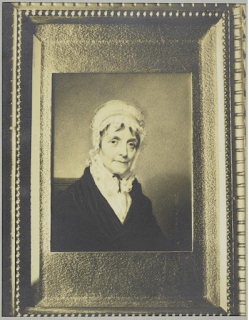 |
| Portrait of Elizabeth Hamilton by Henry Inman (1825) |
Eliza forged ahead, creating a life of her own for the first time. In 1805, she joined the board of the New York Society for the Relief of Poor Widows with Small Children, joining the ranks of women in the early nineteenth century in branching out from their homes to help form and improve society through benevolence. In March 1806, she was one of a group of women who formed the New York Orphan Asylum Society, as many of the small children of poor widows inevitably became orphans. Eliza perhaps also contemplated Alexander’s youth as an underprivileged orphan and transferred some of her love for him to young people in need.
Eliza led this organization from its formation in a small rented home in May 1806, and quickly realized more space was needed. A lottery grant from New York City Council raised $5000 toward a new building with more space for children’s quarters, as well as rooms for schooling, religious studies, and trade skill training. In Eliza’s lifetime, hundreds of children would receive housing, care, and education through the Orphan Asylum Society that she founded.
Her son, James, shared an anecdote of this time in his memoir. ‘She found a little fellow in the arms of a fireman whose parents had been destroyed by the burning of their house. Being an orphan, she directed the fireman to take the little “McKavit” to the Orphan Asylum, on the Bloomingdale Road, giving him the means to hire a carriage to do so, and gave him her card.’ Many years later, Eliza found this young man a position at the Military Academy. When he was killed in the Mexican American War, he left all he had to the Orphan Asylum that had cared for him. This organization exists to this day as the Graham Windham in Brooklyn.
 |
| Portrait of James Alexander Hamilton by Aimee Thibault |
The above quote from James Hamilton's memoir is not the only one I included in Eliza's chapter. In fact, I became so interested in his observations and experiences that I decided to write about him next! I hope that my dear readers will be as enchanted by James as I am. This third son of Alexander and Eliza lived to be 90 years old and was an intellectual observer of the Early Republic from the American Revolution through the Civil War.
Eliza tirelessly continued her work for poor women and orphans in New York City throughout most of the last fifty years of her life, petitioning the city for grants, increasing awareness of public needs, and personally overseeing the work of the orphan asylum for many of those years. ‘She was a most earnest, energetic, and intelligent woman,’ wrote her son, James. ‘Her engagements as a principal of the Widow’s Society and Orphan Asylum were incessant. In support of these institutions she was constantly employed, and as I once playfully told her, “Mamma, you are a sturdy beggar.” She replied, “My dear son, I cannot spare myself or others; my Maker has pointed out this duty to me, and has given me the ability and inclination to perform it.”’The world of women’s charity work of the early nineteenth century was one into which Eliza fit perfectly and helped define. She was able to extend her love for family and children to include those who needed her. As her children grew and had families of their own, she spent increasing time helping other women raise their children and serving as a substitute mother to those who had lost their own. Eliza not only was able to be a part of the raising of dozens of children, she had the connections necessary for the fundraising that was vital to any charitable organization.She had connections with those who had resources but continued to struggle with the financial situation in which her husband had left her. In a letter to her son, James, dated 11 May 1827, Eliza reveals her continued need and her gratitude toward those who assisted her. ‘My Dear Son: Your unremitting kindness and attentions, and in this last instance of providing for my comfort, demands my most ardent and affectionate thanks….As all good acts are recorded in the habitation where your father now is, I have no doubt this one will be proclaimed to him, and have thus given him another motive to implore continued blessings upon you.’


No comments:
Post a Comment